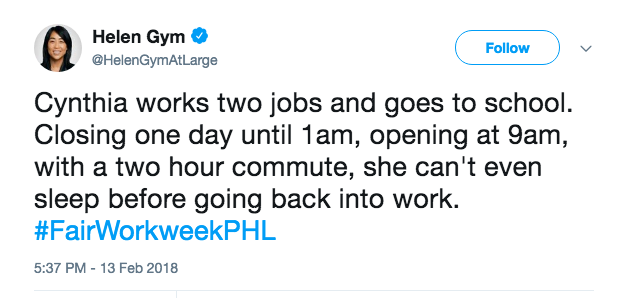Philadelphia could become the next major city to require fair scheduling in the fast food and retail industries.
Philadelphia has the reputation of a struggling economy. This could be due to the fact that Philly’s retail and service workers (mostly part-timers) have been struggling with low pay and unpredictable schedules. As a result, far too many workers in Philadelphia struggle with poverty.
In the past, Philadelphia passed legislation to tackle these unstable work environments. In 2015, the city passed a mandatory paid sick-leave bill hoping to solve these issues. However, for on-call and hourly workers, it wasn’t enough.
In fact, recent Berkeley study found that many of Philadelphia’s hourly wage workers have experienced up to a 14-hour difference in schedules from week to week, with more than a third of workers receiving less than a one-week advance notice of their work schedule, and 62 percent receiving fewer than two weeks notice. The study also found that more than 75% of the employees surveyed want a more predictable schedule.
As a result, City council member Helen Gym introduced a bill that would require employers in those industries to give workers predictable schedules. These practices aim to protect employees but also benefit business. “They’re already doing this work in New York City and Seattle,” Gym said, “There’s no reason they can’t do it here in Philadelphia.”
Advocating for a Fair Workweek
Workers in Philly are now advocating for a Fair Workweek law. If passed, Philly would join 15 other municipalities and states around the country that have laws in place that guarantee a fair workplace. Many workers are hoping that the city council will take notice of what’s occurring in cities like New York City and bring in Mayor De Blasio’s ‘predictable scheduling and predictable paychecks should be a right, not a privilege’ concept to Philadelphia. Like Philadelphia, the majority of New York’s hourly workers were struggling to make ends meet.
Is your business affected by these predictive scheduling ordinances? As a business owner, it’s critical to be informed on these laws to avoid hefty fines and even lawsuits. Download the following e-Book to learn about these predictive scheduling laws that are spreading across the nation:

However, the bill was opposed by the Greater Philadelphia Chamber of Commerce before it was ever introduced, calling the legislation “another anti-growth, out of sync initiative introduced in city council.”
Democrat City Councilwoman Helen Gym stated that “they were opposed to us having the hearing” and that “it’s clear they have taken the most backwards and regressive step.” The councilwomen will need the support from other councilmen and lawmakers in order to make the proposed bill a law.
Gym hopes that the bill will provide security for the 130,000 hourly workers who earn low wages in the retail, foodservice, and hospitality industries. During the release of this bill, Gym stated:
“This bill is one of the most significant efforts we as a city can do to improve the lives of working Philadelphians and support smart business practices. In a city with such high poverty, we have to recognize that people aren’t poor by choice. Too many people are kept in poverty because of terrible practices like abusive scheduling that wreak havoc on people’s lives and leave them unable to predict their monthly incomes for rent or childcare. This isn’t just in the best interests of people—it’s smart business practice.”
Currently, the bill has seven co-sponsors. The bill will pick back up in the fall when it will go to vote.
Proposed Bill Requirements
The fair workweek ordinance would require:
- Advanced notice of schedules
- At least 11 hours rest time between shifts
- Opportunities to work additional hours
- Compensation for last-minute schedule changes
- Protection from retaliation
- Enforcement and penalties if an employer does not comply
This bill would only impact chains with at least 250 employees and 20 locations. Small and independent businesses will not be affected by the bill.
Listen to this podcast to hear Councilwoman Helen Gym explain this proposed Fair Workweek legislation.
How Employers Can Prepare
Since momentum is gaining for these types of laws, employers should be well prepared and informed if and when these predictive scheduling laws are passed in jurisdictions where they do business.
So how can employers prepare themselves? The tips below will make sure your business is on the right side of the law:
- Invest in a workforce management tool
- Review Company Policies
- Provide Predictable Schedules
- Stay Informed
Ultimately, businesses that provide predictable schedules will be the market winners in recruiting and retaining the top talent.
Here at Deputy, we make it our mission to provide trustworthy news and information that could benefit our customers. Subscribe to our blog to stay updated on these legislations.


